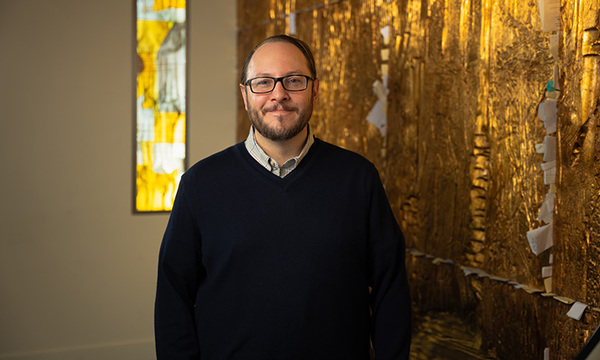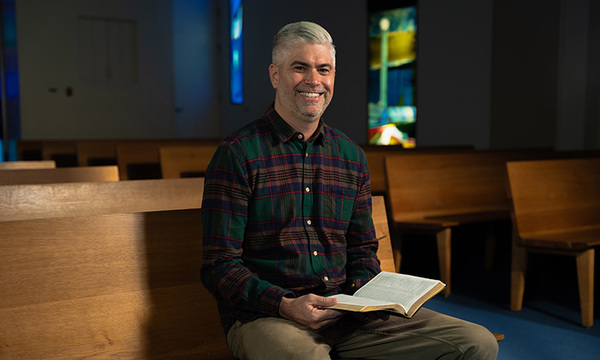The mental health crisis in the U.S. impacts all of us, including the church, so how can ministry workers be prepared to meet people’s mental health needs?
Talbot School of Theology is launching a marriage and family therapy program in the fall of 2020 to train and prepare Christian therapists to address this urgent area of need. In anticipation of Talbot’s upcoming program in marriage and family therapy, we asked Sunny Song (M.A. ’95, Psy.D. ’02), associate professor of Christian ministry and leadership, for her insights on the mental health crisis and how trained Christian therapists can partner with the church.
Song is a licensed clinical psychologist with a clinical practice and background in spiritual direction and psychoanalytic psychotherapy. She specializes in the spiritual direction and mental health of Korean Christians, and teaches courses in pastoral care and counseling internship, and works with Korean students in the D.Min. program.
Q: With your specialty in mental health, could you share some insights based on the current research on mental health rates in the U.S.?
It is alarming to see current mental health reports on brain research. According to numerous research findings, the neurobiological consequences of early stress and childhood maltreatment are related to PTSD, cognitive-learning problems and comorbid mental illness. We are living in a world where the divorce rate is 50%. Consequently, more and more children are growing up in a home where negligence and abuse is prevalent. According to research findings, contrary to our belief, Christian communities are not immune from the secular population in relational difficulties and mental health issues.
Research findings show that 50% of all lifetime cases of mental illness begin by age 14 and 75% by age 24. Furthermore, the frightening news is the average delay between the onset of symptoms and intervention is between 8 and 10 years. The challenge for pastors is that congregations seek help first from their pastors before they seek help from professionals.
We need to pay more attention on repairing and rebuilding people’s broken-heartedness and relational difficulties in their families. We need competent spiritual leaders who are equipped to deal with current life issues including mental health issues. A proactive approach includes early intervention and psychoeducation, which are key elements to preventing mental illness.
Christian leaders’ role to care for wounded souls is a pressing need, and equipping leaders to do effective ministry is important. Seminary training should be designed to equip pastors to deal with current relational issues such as divorce, remarriage, step-parenting, domestic violence, trauma and grief, depression, suicide and all kinds of addiction. It is impossible to do this alone. This challenging ministry can be done by creating a team of mental health professionals to work with church leaders. I’m thrilled that Talbot School of Theology is launching a marriage and family therapy program, starting in the fall of 2020.
Q: How has technology impacted the growing mental health crisis among young adults in the age of social media?
Fast-developing technology is making young adults more vulnerable to social media, which leads to addictive behavior. Users have access to their devices around the clock with violent content that may lead to antisocial behavior.
Social media provides a convenient outlet for lonely, vulnerable and insecure youth, who desire validation as they develop into adulthood. Research reports that social media platforms are designed for excessive use by providing attractive topics which likely induce addictive behavior. Furthermore, the average time spent on social media is about nine hours with users reporting that they find it difficult to stop without unpleasant outcomes. Consequently, excessive time on social media robs people from creating and maintaining meaningful relationships with others. And this lack of human contact and addictive behavior on social media results in poor communication skills, poor social skills, low self-esteem, poor empathy capacity, depression, anxiety and suicidal thoughts.
The human brain’s maturing process is slow. The brain keeps on maturing until age 30. Early exposure to social media affects the brain’s reward system, which interferes with the building of the neurons’ wiring network. A mature brain has capacity to tolerate adverse situations and delayed gratification, while an addictive brain seeks quick gratification without foreseeing negative consequences. As God’s image-bearers, we are created to seek meaningful bonding with real people. Good attachment with trusted individuals fosters secure relationships. When people’s relationship needs are not met, they find substitutes to fill the void. Unlike real relationships, people on social media may experience fake intimacy and or harmful effects when comparing their lives to others they see. Cyber bullying is also a big problem as it damages younger adults’ self-esteem.
Q: Christians and pastors are not immune from the impact of mental illness. How can churches be better equipped to minister to those who are struggling with mental health issues?
Churches need to address mental health issues seriously. This applies not only to congregations but also to pastors themselves. Seventy percent of pastors do not have a close friend, confidant or mentor. When church leaders are not connected with a healthy community, the vicious cycle is inevitable: isolation exposes pastors vulnerable to temptations, sin leads to secrecy, which brings further isolation.
Seminary training needs to address students’ brokenness and woundedness first and help them to reconcile with their whole personhood. Otherwise, we are sending out wounded and unprepared spiritual soldiers into a fiery spiritual battlefield. We can no longer deny the liabilities and casualties that are showing up in current research findings. In addition, seminary training needs to meet these challenging needs. Research findings show that 90% of pastors report their seminary training is not adequate; 80% of pastors feel unqualified and discouraged in their role as a pastor. Pastors can build a network of help with mental health referral resources.
In the Bible, we see the position of prophet and priest along with kings to govern the people of God. Collaboration with mental health professionals would be necessary in current ministry models. Most of my referrals come from Talbot alumni. Talbot students who met me during their study here trust me to be their mentor and consultant to not only deal with their overwhelming relational and mental health issues, but also their congregations’ needs.
Q: In what ways are Christian counselors and therapists different from their secular counterparts in their vocation?
Christian counselors and therapists are fundamentally different from their secular counterparts. For Christian counselors and therapists, their work is not a mere vocation but a calling from God. Their Christian worldview is foundationally different and redemptive in its outlook: creation, fall and redemption in Christ. Fallen people need to reconcile with God first, and then with others respectively to reconnect to God’s creation resources.
Reconciliation with others indicates a community-centered sanctification process, where a mending of brokenhearted condition takes place. Spiritually, MFT students need to go into this redemptive restoration process with God first. Academically, they need vigorous training to obtain current scientific knowledge and skills in mental health.
Secular therapists’ role is to work on the clients’ symptom relief and improve functioning capacity in society. Their primary aim is to restore balance between body and soul.
Q: You have a special interest in the mental health of Korean Christians. What hindrances do Korean pastors and churches face in adequately interacting with those in their congregations struggling with mental illnesses?
SHAMING CULTURE
A shaming culture does not allow for weakness or the display of one’s brokenness. Mental illness is perceived as God’s judgment and punishment, which brings shame to not only an individual, but also to a family. Korean Christian culture is embedded in the soil of Confucianism and shaming is a strong factor and tends to create outwardly legalistic Christians. The teachings of Confucianism emphasize intellectual knowledge and moral formation, which is fertile ground for legalistic Christians. The value of saving face and upholding family honor leads to the denial of mental health issues in a family and church. Due to Confucianism’s hierarchical social structure, the pastor is regarded as a spiritually higher entity than parishioners. Pastors are idealized and placed on a pedestal. Consequently, idealized pastors are not allowed to admit any immoral issues and mental health issues. These shaming situations lead to isolation among pastors and expose them to vulnerable temptations. Unlike redemptive theology that proclaims “No condemnation,” there is no ground for people’s broken hearts to be healed in a shaming culture.
PROSPERITY GOSPEL
The Korean church experienced much growth after Dr. Billy Graham’s evangelistic crusade in the early ’70s, eventually resulting in the emergence of mega-churches with some of the largest church memberships in the world. Subsequently, the prosperity gospel with its emphasis on health and wealth also made inroads in the Korean church. Sadly, this health and wealth mindset does not acknowledge people’s internal woundedness and their struggle with mental illness.
DICHOTOMY OF SPIRITUAL VERSUS SECULAR
Some pastors do not see the value of integrating the so-called “secular” disciplines like psychology in their ministry and tend to place an emphasis on moral formation. Although there is an increased interest in spiritual formation, most pastors have not experienced the process personally and therefore there’s a lack of a healthy model or a supporting network to foster a redemptive Christian community.
BREAKING CONFIDENTIALITY
Most pastors are not trained to keep things confidential, therefore, private information leaks out occasionally through prayer requests, resulting in a betrayal of confidence, which makes church counseling more difficult.
Q: How can ministry leaders come alongside such individuals in their healing journey? In what ways can professionals like marriage and family therapists work with churches that need assistance?
First, the church needs to earn the trust of its congregation by providing a safe place to open people’s broken hearts to be healed. Churches need to live by redemptive theology, which guarantees “No condemnation in Christ” (Rom. 8:1).
Second, the church needs to collaborate with mental health professionals. Mental health professionals can train small group leaders to provide Christian life coaching and can create a referral network that includes a hotline for pastors. Video consultation is a convenient way to assist pastors whenever and wherever they need assistance from them.
Q: Talbot School of Theology will be rolling out a new program with a focus on marriage and family therapy (MFT) in the fall of 2020. How can this integrated program equip aspiring mental health professionals?
Talbot’s spiritual formation emphasis will foster the aspiring mental health professional’s personal development and help them become better redemptive journey-guiders, resulting in bringing healing to the brokenhearted. Further, our Christ-centered, whole-person approach recognizes humanity’s brokenness and the need for restoration and fullness that comes from a deep and abiding relationship with our Lord. Finally, our academic program is designed to produce not just competent mental health professionals, but also humble servants of God.
Q: What opportunities and prospects will Talbot’s MFT program present to these aspiring therapists?
MFT students at Talbot will undergo scientifically up-to-date clinical training along with a transformative character-formation process. There will be many opportunities to serve in various fields like private clinics, governmental mental health organizations (e.g., the Department of Mental Health), community mental health agencies and schools. Moreover, Christian communities prefer Christian therapists, so missionary organizations, parachurch ministries and churches where mental health and soul care professionals are needed will gladly welcome trained therapists to serve with them.
Q: Do you have any advice for readers who might be seriously considering Talbot’s MFT program in fall 2020?
I would advise our readers to pray and seek God’s guidance in this matter. I would also advise them to discuss their vision with others in the body of Christ and to seek counsel on this important aspect of their calling. And if they feel led by the Lord, they should go ahead with the application process and complete the academic requirements for the program. Also, it would be helpful to seek their church’s support, if possible, with potential ministry opportunities that can help them financially.
 Biola University
Biola University



